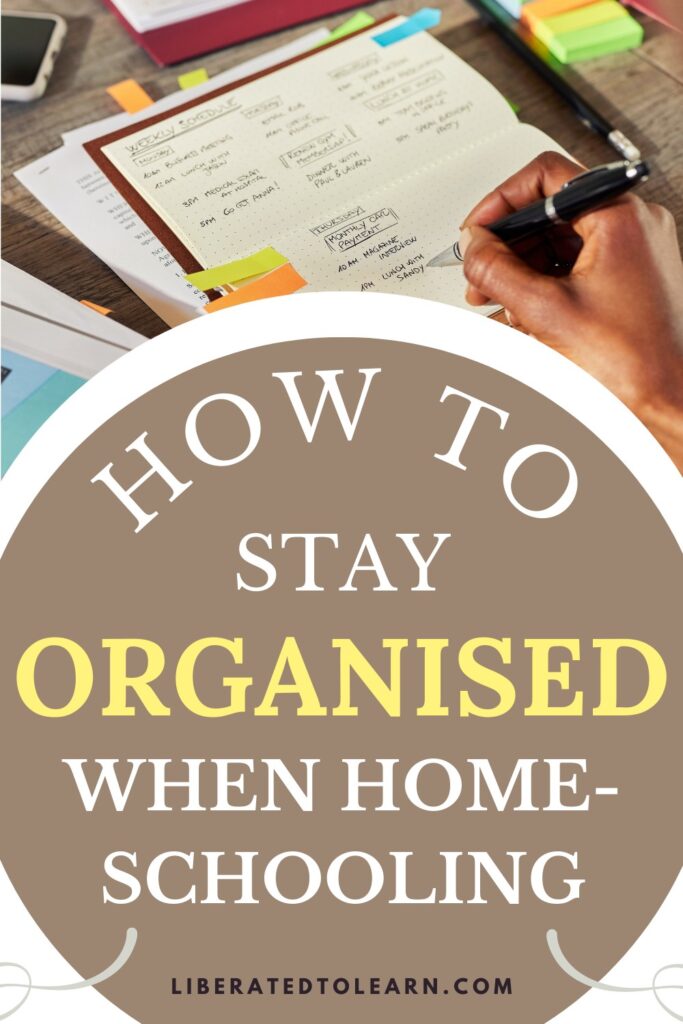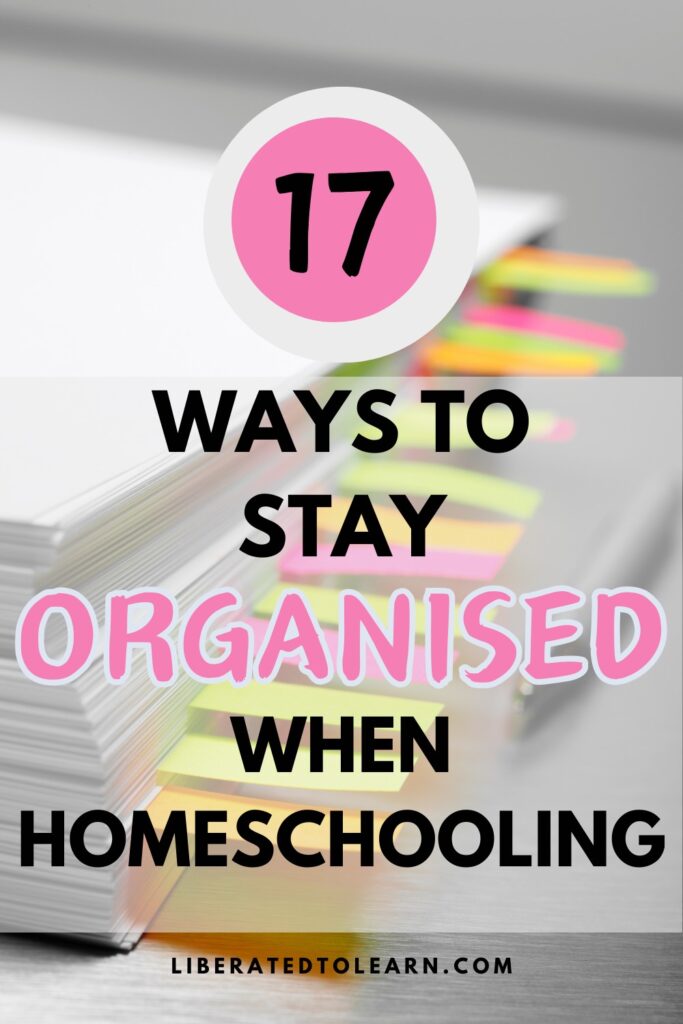Whether you’re new to homeschooling or a seasoned pro, having a solid organisational system in place can make all the difference. These organisation tips have proven to be really useful, so let’s dive into the best ways to stay organised when homeschooling!

Organisation! Sometimes it’s there and sometimes it isn’t. And with homeschooling, it’s likely that you’ll want to try and stay as organised as you can, because things can get overwhelming quite quickly.
That said, organisation looks different for every family. The key is to find what works best for your family and be flexible enough to adapt as your homeschooling journey evolves.
Whether you’re new to homeschooling or a seasoned pro, having a solid organisational system in place can make all the difference. These organisation tips have proven to be really useful, so let’s dive into the best ways to stay organised when homeschooling!

1. Have a Dedicated Learning Space
Having a dedicated learning space is essential for keeping organised because everything will be in one place. And the key is to make sure this space is free from distractions, where your children feel comfortable and are able to both work and relax.
Your learning space doesn’t have to be an entire room in your house; it can be a specific corner or somewhere completely different. You might even be interested in some alternatives to a homeschool room!
Tips for creating a learning space:
- Keep supplies accessible: Store pens, paper, books, and other materials within easy reach. Consider using bins, shelves, or a rolling cart to keep everything organised.
- Personalise the area: Make the space inviting by adding educational posters, a world map, or a whiteboard for lessons and notes. Make sure your children have a say on how their learning space will look.
- Limit distractions: To keep organised, and distractions at bay, it’s best to keep the area free from toys, electronics, and other distractions that could pull your child’s focus away from learning.
2. Create a Do-able Schedule
Even if you’re not a schedule type of person, having one can do wonders for keeping organised. Not only does having a schedule ensure that you have a reliable routine, it also means you can plan for the day and get important things done.
Your schedule doesn’t have to be strict. In fact, we’d advise on creating one that is both do-able and flexible so that you don’t feel under pressure.
Tips for creating a do-able schedule:
- Prioritise accordingly: Start your day off with the most important tasks, lessons and things that you need to get done. Then you can move on to the things that you want to get done.
- Get input from your children: Make sure your children have a say in what the schedule looks like, especially when choosing activities and learning.
- Be flexible: While a routine is important, it’s also crucial to allow some flexibility. If a lesson takes longer than expected or your child shows interest in a particular topic, be willing to adjust your schedule.
- Have regular breaks: Include breaks throughout the day to prevent burnout and use this time to put aside any learning, relax and have fun.
3. Organise with a Homeschool Planner
Homeschool planners are a great way to stay organised when homeschooling because they’re essentially portable schedules (whether physical or digital), where you can write down notes and stay on top of all your homeschooling activities and responsibilities.
Check out some of our great homeschool planner recommendations!
Tips for using a planner:
- Plan daily or weekly: Dedicate time, whether at the beginning of the day or week, to plan out learning, activities, and goals.
- Record progress and memories: Many homeschool planners have pages for recording progress, achievements and even memories, which is great for referring back to.
- Always keep one with you: Keeping your planner with you means you can add to it on the go, which is ideal if things change or you want to record something and not forget about it later.
4. Organise Learning Materials and Storage Spaces
When your learning materials are organised, you’ll feel like everything has its place and you’re less likely to stress. And having storage spaces means that you’ll easily be able to find what you’re looking for without rummaging through clutter.
Tips for organising materials:
- Utilise storage spaces: Have designated storage spaces for different materials.
- Label everything: Label bins, folders, and shelves so that everyone knows where items belong. This makes it easier for your children to put things away when they’re finished.
- Use colour coding: Assign a different colour to each subject or folder. For example, all maths materials could be stored in green folders, while science materials are kept in blue. This visual system can make it easier to stay organised.
- Sort through materials regularly: Go through your homeschooling materials periodically and get rid of anything you no longer need. This could include outdated curriculum, completed worksheets, or supplies that your child has outgrown.
5. Keep a Portfolio of Work
Portfolios are great for tracking progress and keeping all completed work organised. It’s also useful if you need to provide documentation for educational authorities at some point.
Tips for keeping a portfolio:
- Include samples of work: Regularly add samples of your child’s work, such as completed worksheets, art projects, and writing assignments. This provides a clear record of their progress.
- Track milestones: Document important milestones, such as mastering a new skill or completing a challenging project. Include dates and any relevant notes.
- Organise by subject: Divide the portfolio by subject to make it easy to find specific information. Use tabs or folders to keep everything neatly organised.
6. Use Checklists and Create To-Do Lists
I don’t know about you, but we love a good checklist or to-do list. There’s no better feeling than checking off completed tasks and seeing how many you can get through. They’re especially useful for keeping on track of things and knowing what you have to do next.
Tips for using checklists and to-do lists:
- Make a checklist or to-do list at the start of the day: By making a checklist or to-do list first thing, you’ll be better prepared for the day and know exactly what you’ve got to do.
- Prioritise essential tasks first: List more important or essential tasks first to ensure they get done.
7. Plan Ahead and Prep
A great way to stay organised when homeschooling is to always plan ahead and prep what you can. This could mean prepping weekly meals, planning on when you’re going to do chores, making weekly plans, and planning for upcoming events.
Tips for planning ahead and prepping:
- Dedicate time to planning and prepping: Always put time aside for planning. This way, you’ll stay organised and manage to keep on top of things.
- Involve your children: A good idea is to involve your children in planning and prepping things. They could help you with batch cooking or completing specific tasks.
- Plan and prep for busier periods: If you have upcoming plans, holidays or celebrations, ensure that you plan and prep beforehand to save you time and stress.
8. Set Goals
Setting goals will always give you and your child something to work towards, and this can actually help you stay much more organised. We find that daily or weekly goals are easily manageable and achievable.
Tips for setting goals:
- Set realistic goals: Make sure the goals you set are achievable and tailored to your child’s abilities. Break larger goals into smaller, manageable steps.
- Involve your child: Include your child in the goal-setting process. This gives them a sense of ownership and motivation to achieve the goals they have set.
- Review regularly: Check in on your progress regularly and adjust goals as needed.
9. Declutter Regularly
When you regularly declutter, you’ll find that you’re probably hoarding a lot more than you actually need. So, having a good sort out will definitely maintain a more organised homeschooling environment. As we all know, a clutter-free space leads to a clutter-free mind.
Tips for decluttering:
- Get rid of unused items: If it’s not being used, get rid of it or donate it! By regularly going through your homeschool space, you can remove a lot of unused items, such as old books and homeschool supplies.
- Adopt a minimalist approach: Keep only what you truly need and use regularly. This reduces the amount of stuff you have to organise and maintain.
- Teach your child to declutter: Encourage your child to take responsibility for their own belongings. Regularly decluttering their own workspace can help them develop good organisational habits.
10. Use Technology Wisely
Technology can be really useful when homeschooling and at times it’s great for keeping organised too. As a lot of things are becoming digital now, it’s best to use technology wisely, rather than to solely rely on it.
Tips for using technology:
- Use educational apps: There are countless apps designed to help with everything from lesson planning to interactive learning. Find the ones that work best for your homeschooling style.
- Keep digital files organised: If you’re using digital resources, create a filing system on your computer where you can easily access lesson plans, worksheets, and other materials.
- Limit screen time: While technology is helpful, it’s important to balance it with hands-on learning and physical activities. Set limits on screen time so that your children can engage with more interactive educational experiences.
11. Balance Homeschooling With Other Responsibilities
Managing other responsibilities when homeschooling can be challenging, but finding a balance is essential to keep things running smoothly.
Tips for balancing responsibilities:
- Delegate tasks: Involve your children in age-appropriate household chores. This not only lightens your load but also teaches them responsibility and life skills.
- Use time-saving strategies: Meal planning, batch cooking, and creating a cleaning schedule can help you manage household duties more efficiently, leaving more time for homeschooling.
- Prioritise self-care: Don’t forget to take care of yourself. Schedule regular breaks, and make time for activities that recharge you. A well-rested and happy parent is better equipped to handle the demands of homeschooling.
12. Get Support From Others
Staying organised doesn’t mean you should carry the burden of everything. Instead look for support elsewhere, whether it be from friends, family or other homeschooling families. By building a reliable support network, you can maintain a more organised homeschool.
Tips for getting support:
- Join homeschooling groups: Many communities have homeschooling groups that offer activities and social events. These groups can be a great source of support, providing both advice and encouragement.
- Participate in online communities: There are numerous online forums, Facebook groups, and websites where homeschoolers can share tips, resources, and experiences.
- Organise co-op classes: If possible, collaborate with other homeschooling families to organise co-op classes or group learning sessions. This is perfect for practising organisation skills.
13. Practise Patience and Flexibility
Sometimes, organisation isn’t about having everything perfectly planned because not everything will always go to plan, and that’s okay. Instead, it’s best to be open minded and flexible when it comes to homeschooling.
Tips for patience and flexibility:
- Adjust expectations: Be willing to adjust your expectations and goals as needed. Sometimes, less is more, and focusing on quality rather than quantity can be more beneficial.
- Embrace imperfections: Understand that some days will be more productive than others, and that’s perfectly normal. Be gentle with yourself and your children when things don’t go as planned.
- Celebrate small wins: Acknowledge and celebrate even the smallest successes. It’s the best way to stay motivated even when you feel like you’re not doing enough.
14. Teach Organisation
If you want to stay organised when homeschooling, one of the best things you can do is teach your children how to stay organised too. By teaching organisation skills, everyone in the household will be willing to put in a joint effort and keep things organised.
Tips for organisation:
- Teach the importance of organisation: Explain to your child why being organised is important and essential for reduced stress and a more positive mindset.
- Motivate your children: Give your child incentives for staying organised.
- Lead by example: By leading by example and demonstrating your own organisation skills, you allow your children to see and learn from you and replicate the same behaviour.
15. Encourage Regular Clean-Up Sessions
Keeping your homeschooling space organised requires consistency and regular clean-ups. When you schedule these clean-up sessions, you ensure that you stay on top of tidiness and reduce clutter.
Tips for clean-up sessions:
- End-of-day tidy-up: Dedicate the last few minutes of each day to tidying up the learning space. If everything is in its place, you’ll always be ready for the next day.
- Weekly deep clean: Set aside time each week for a more thorough clean-up, including organising materials and decluttering.
- Involve the whole family: Make cleaning up a family affair. Assign specific tasks to each family member to share the responsibility and make the process quicker.
16. Have a Weekly Review
A weekly review session can help you assess what’s working and what needs adjustment. You’ll feel much more organised after reflecting on everything.
Tips for weekly reviews:
- Review goals: Go over the goals set at the beginning of the week. You’ll know exactly what was accomplished and what you still need to work on.
- Get feedback from your child: Ask your child how they felt about the week—what they enjoyed, what they found challenging, and any suggestions they might have for the upcoming week.
- Plan for the next week: Use the review session to plan for the next week. Adjust schedules, set new goals, and make any necessary changes to improve the homeschooling experience.
17. Have a Backup Plan
Life is unpredictable, and sometimes things don’t go as planned. Having a backup plan can help you stay organised even when unexpected events arise.
Tips for creating a backup plan:
- Prepare a “rainy day” kit: Put together a kit of activities, such as educational games, puzzles, or documentaries, that your children can do independently when you’re unable to stick to your regular schedule.
- Plan for sick days: Have a plan in place for days when you or your child is unwell. This might include light, self-directed activities or a modified schedule.
- Be flexible: Remember that it’s okay to deviate from the plan when necessary. Flexibility is key to staying organised and reducing stress in the long run.
We hope these tips help you to stay more organised when homeschooling! Remember, what works for some might not work for others and everyone has different levels of organisation. The main thing to focus on is making your homeschooling journey as easy, stress-free and fun as possible!

m@liberated
Want more from Liberated to Learn?
Subscribe to stay updated about new posts, resources and giveaways!













